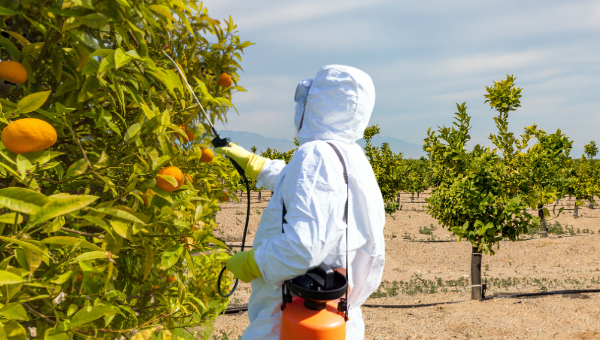09
Jun
Court Blocks Trump-era, Toxic Citrus Pesticide, Defended by Biden EPA

(Beyond Pesticides, June 9, 2021) Earlier this week the U.S. Court of Appeals for the District of Columbia blocked the U.S. Environmental Protection Agency (EPA) from approving use of the hazardous insecticide aldicarb on citrus crops in Florida. The decision comes shortly after Nikki Fried, Florida’s Agriculture Commissioner, denied a state-level registration for aldicarb, which was cancelled in the United States over a decade ago due to risks to children and water contamination. Health, conservation, and farmworker advocates that brought the suit are praising the court’s decision.
“We applaud this decision by the court whose ruling confirms what we already knew — that there is no place for a toxic pesticide like aldicarb to be used on crops in Florida where our workers and our water would be at grave risk,” said Jeannie Economos, coordinator of the Pesticide Safety and Environmental Health Project at Farmworker Association of Florida in a press release. “Farmworkers can breathe a bit easier knowing that this neurotoxin will not be used on the citrus crops they harvest. We are grateful to Florida commissioner of agriculture Nikki Fried for refusing to allow this toxin to poison our communities, our food and our environment. This decision sends a message to EPA — protecting people and the environment must be their top priority.”
Shortly before the end of the last administration, former EPA Administrator Andrew Wheeler provided one last handout to the agrichemical industry by approving aldicarb for use on Florida’s citrus groves. The move came after a meeting between Mr. Wheeler, regional EPA staff, and the Florida Fruit and Vegetable Association in October 2020, where the industry group urged EPA to reregister the banned chemical. Although the chemical was approved quickly, advocacy groups responded in kind by placing pressure on EPA, and filing a legal challenge to the decision.
By April, Commissioner Fried had heard from both sides, and the Florida’s Department of Agriculture and Consumer Services rejected state-level approval of the hazardous insecticide. “While there are promising new horizons for fighting citrus greening, like recent breakthroughs at UF/IFAS on genetic resistance, aldicarb poses an unacceptable risk to human, animal, and environmental health in Florida, is one of the world’s most toxic pesticides, and is banned in more than 100 countries,” said Florida Agriculture Commissioner Nikki Fried. “The registrant’s application does not meet the requirements of state law, and we must therefore deny the registration of aldicarb for use in the State of Florida.”
In rejecting EPA’s approval of aldicarb, the court cited the state’s denial, and found that EPA did not comply with Endangered Species Act requirements prior to registration. “We’re thrilled the court has rejected use of one of the most dangerous pesticides in history on Florida oranges and grapefruit,” said Nathan Donley, PhD, environmental health science director at the Center for Biological Diversity. “This important decision is a sharp rebuke of the EPA’s pesticide office, which even under the Biden administration chose to dismiss science and the law to protect profits at the expense of farmworkers, children and endangered species.”
While the Biden administration has made important, hopeful statements about certain pesticides and taken some minor steps towards improving protections, it has continued to defend heinous decisions by the previous administration, like the allowance of aldicarb and reregistration of the bee-toxic insecticide sulfoxaflor, in the courts. It is becoming increasingly evident that it will take persistent public pressure to move the Biden EPA to make decisions that are in the interest of public health and the environment.
Aldicarb should never have been considered for use on citrus crops, and should be completely eliminated from use in the United States and around the world. The chemical is banned in over 100 countries under the international Rotterdam Convention, which the U.S. has signed but not ratified.
Aldicarb is a poster child for why pesticide product stewardship is an oxymoron, say advocates. Its downstream effects result in the poisoning of farmworkers, contamination of drinking water, and residues on food can put children at increased risk of serious health problems. EPA findings at the time of aldicarb’s 2010 cancellation showed that use on citrus crops represented the highest risks to children. Upstream effects of aldicarb are also devastating. It is primary feedstock, methyl isocyanate, is the same chemical that caused the Bhopal, India disaster, one of the worst environmental crimes in history where over 25,000 men, women, and children died or were permanently disabled after a leak occurred at a plant owned by Union Carbide (a company later purchased by DowDuPont/Corteva). Every step of aldicarb’s supply chain leaves a trail of pain and suffering for those involved, while industry executives removed from the day to day of the chemical’s use continue to profit.
Despite the federal court’s decision, it is possible EPA may appeal or take further administrative action in favor of industry, as was done after dicamba’s registration was vacated by the courts. New staff at EPA’s Office of Chemical Safety and Pollution Prevention have acknowledged political interference in that decision and committed to scientific integrity moving forward. Aldicarb should be a simple test for such an approach, advocates note. Join us in telling EPA to reverse its approval of highly toxic aldicarb now.
And for more information on the hazards of pesticides and their alternatives, and to hear from experts working on cutting edge legal, advocacy, and scientific approaches, sign up for Beyond Pesticides first ever virtual National Pesticide Forum. June 15 is the last week of the forum, but signing up will also get you access to the full range of speakers and presentations!
All unattributed positions and opinions in this piece are those of Beyond Pesticides.
Source: Center for Biological Diversity










